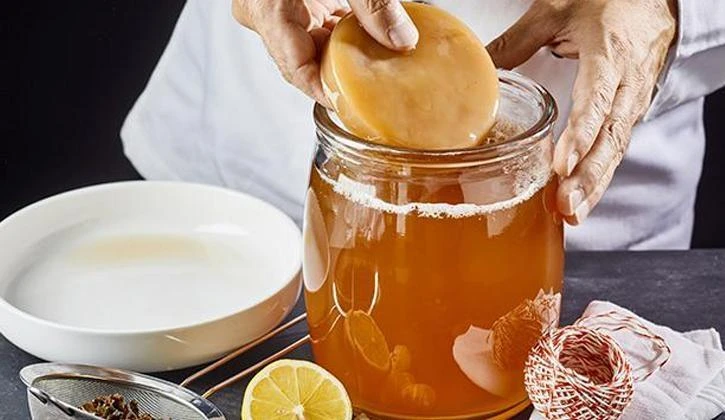

Kombucha appeared to lower average fasting blood glucose levels after four weeks from 164 to 116 milligrams per decilitre
According to the findings of a clinical trial conducted by researchers at Georgetown University’s School of Health, the University of Nebraska-Lincoln, and MedStar Health, people with type II diabetes who drank the fermented tea drink kombucha for four weeks had lower fasting blood glucose levels than those who drank a similar-tasting placebo beverage.
This conclusion from a pilot 12-person feasibility trial suggests the possibility of a nutritional intervention that could help lower blood sugar levels in persons with diabetes, as well as laying the groundwork for a bigger trial to validate and expand on these findings. This finding was reported in Frontiers in Nutrition.
Kombucha is a tea fermented with bacteria and yeasts and was consumed as early as 200 B.C. in China, but it did not become popular in the U.S. until the 1990s. Its popularity has been bolstered by anecdotal claims of improved immunity and energy and reductions in food cravings and inflammation, but proof of these benefits has been limited.
“Some laboratory and rodent studies of kombucha have shown promise and one small study in people without diabetes showed kombucha lowered blood sugar, but to our knowledge this is the first clinical trial examining effects of kombucha in people with diabetes,” says study author Dan Merenstein, M.D., professor of Human Sciences in Georgetown’s School of Health and professor of family medicine at Georgetown University School of Medicine. “A lot more research needs to be done but this is very promising.”
Merenstein continued, “A strength of our trial was that we didn’t tell people what to eat because we used a crossover design that limited the effects of any variability in a person’s diet.”
The crossover design had one group of people drinking about eight ounces of kombucha or placebo beverage daily for four weeks and then after a two-month period to ‘wash out’ the biological effects of the beverages, the kombucha and placebo were swapped between groups with another four weeks of drinking the beverages. Neither group was told which drink they were receiving at the time.
Kombucha appeared to lower average fasting blood glucose levels after four weeks from 164 to 116 milligrams per decilitre while the difference after four weeks with the placebo was not statistically significant. Guidelines from the American Diabetes Association recommended blood sugar levels before meals should be between 70 to 130 milligrams per decilitre.
The researchers also looked at the makeup of fermenting micro-organisms in kombucha to determine which ingredients might be the most active. They found that the beverage was mainly comprised of lactic acid bacteria, acetic acid bacteria, and a form of yeast called Dekkera, with each microbe present in about equal measure; the finding was confirmed with RNA gene sequencing.
The kombucha used in this study was produced by Craft Kombucha, a commercial manufacturer in the Washington, DC, area. It has been re-branded as Brindle Boxer Kombucha.
“Different studies of different brands of kombucha by different manufacturers reveal slightly different microbial mixtures and abundances,” says Robert Hutkins, Ph.D., University of Nebraska-Lincoln and the study’s senior author. “However, the major bacteria and yeasts are highly reproducible and likely to be functionally similar between brands and batches, which was reassuring for our trial.”
“An estimated 96 million Americans have pre-diabetes — and diabetes itself is the eighth leading cause of death in the U.S. as well as being a major risk factor for heart disease, stroke and kidney failure,” says Chagai Mendelson, M.D., lead author who was working in Merenstein’s lab at Georgetown while completing his residency at MedStar Health. “We were able to provide preliminary evidence that a common drink could have an effect on diabetes. We hope that a much larger trial, using the lessons we learned in this trial, could be undertaken to give a more definitive answer to the effectiveness of kombucha in reducing blood glucose levels, and hence prevent or help treat type-II diabetes.”
Germany has come out resolutely behind India and its fight against terrorism under Operation Sindoor.…
Baloch leader Mehran Marri has accused Pakistan of unlawfully occupying Balochistan since 1948, transforming the…
The Trump administration announced on Wednesday that it will continue its efforts to prevent advanced…
External Affairs Minister S Jaishankar met with German Chancellor Friedrich Merz in Berlin on Friday…
The Central Tibetan Administration (CTA) launched a Month-long Panchen Lama Awareness Program aimed at educating…
India's Ambassador to Russia, Vinay Kumar, on Friday, briefed the all-party parliamentary delegation, led by…